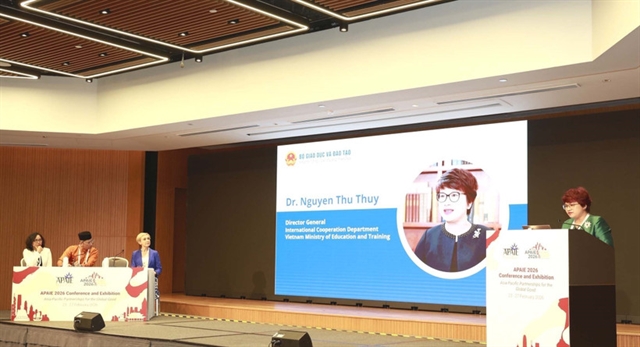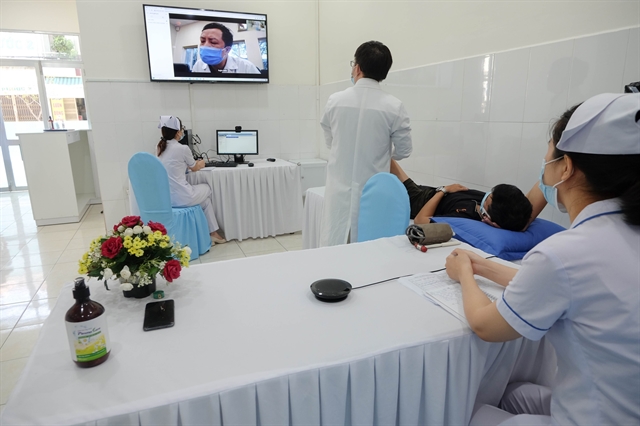 Society
Society

 |
| A doctor at the Ministry of Public Security's Hospital 199 and a doctor of Hà Nội Medical University Hospital coordinate to examine a patient at Hospital 199 via the telemedicine application.— VNA/VNS Photo |
HÀ NỘI — Technology applications in genome monitoring, sharing data on epidemics and developing remote medicine are evaluated as highlights of the domestic health sector over the past three years since the COVID-19 pandemic.
Đỗ Trường Duy, director of the National Health Information Centre under the Ministry of Health, told Lao động (Labour) online newspaper that the centre was promoting several platforms including Vtelehealth – a platform supporting remote medical examination and treatment, a platform to manage electronic health records, a platform to manage vaccination, and a platform to manage medical facilities.
The applications could be easily integrated with other medical facility platforms, he said.
The Vteleheath application had attracted more than 1,000 doctors to participate with more than 11,300 medical examination and consultation sessions conducted, reducing the load on medical facilities and enhancing medical digital transformation, he said.
Nguyễn Hoàng Bắc, Director of Hồ Chí Minh City University of Medicine and Pharmacy Hospital, said that the hospital had built and developed a complete electronic medical record.
The electronic medical record software had many functional modules such as inpatient, outpatient, pharmacy, record management, health insurance and finance, he said.
The modules were interconnected to not only serve medical expertise but also improve management and customer service, he said.
Each patient treated at the hospital was given a complete personal health record with medical information, personal history, drug allergy information and treatment methods, he said.
Currently, the hospital also performed remote medical examination and treatment, developed artificial intelligence (AI) in diagnosis, deployed image storage and management systems, as well as built and digitised professional processes, treatment and care of patients, he said.
Key points in health sector’s digital transformation
Professor Trần Văn Thuấn, Deputy Minister of Health, said the goal of the ministry was to continue to improve technical solutions, research, and promulgation of policies to create more favourable conditions for telemedicine, especially the deployment of digital medical platforms in the future.
Innovation in the health sector included the development and application of new ideas, technologies, processes and solutions that improve quality and promote the application of scientific advances in medicine, he said.
The health sector had pioneered innovation in several aspects, he said.
In terms of technological innovation, the health sector had strengthened the operation of new medical devices, diagnostic equipment, telemedicine solutions, electronic health records and medical information systems.
In terms of digital applications, the health sector had integrated digital technologies in medical equipment to help to continuously and remotely monitor health and promptly receive medical consultation information.
In terms of predicting disease trends through big data analysis, the health sector had applied data analysis and big data technology to extract information and help predict disease outbreaks and changing trends of the disease structure in the community.
In terms of biotechnology, the health sector had applied biotechnology innovation in the control of biological processes to develop new methods and techniques in treatment, advanced therapies such as gene therapy, stem cells and regenerative medicine.
In terms of telemedicine, innovations in telemedicine had expanded the access to health care services, allowing remote consultations with providers, reducing the need for in-person examination, improving service provision for remote areas, islands, grassroots healthcare and in cases of natural disasters and epidemics.
Thuấn also said that innovation in the health sector required coordination between medical experts, technologists, policy makers and investors to bring about positive change in the fourth revolution. — VNS




